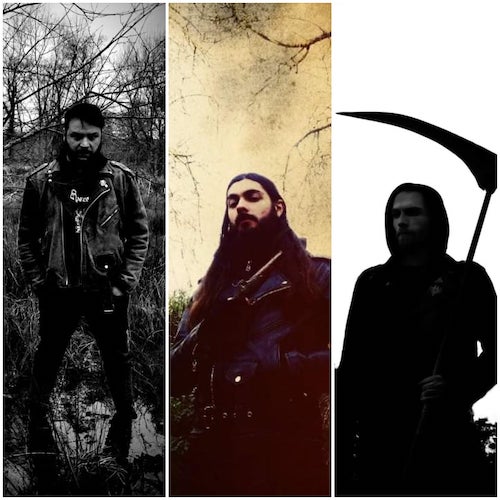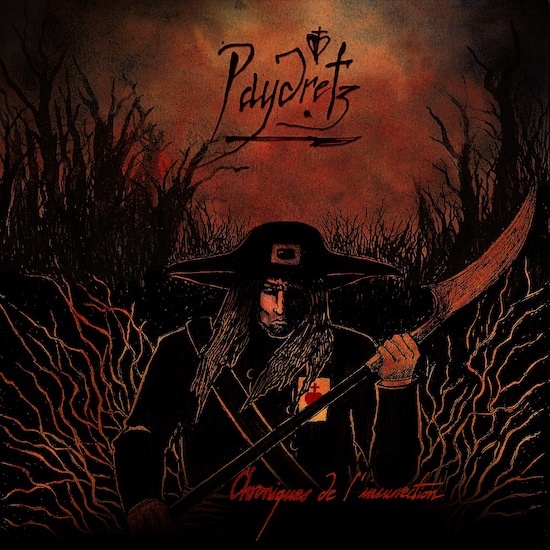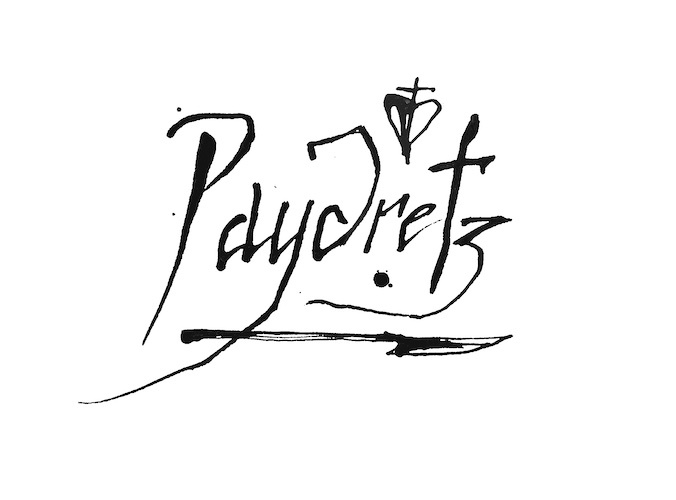
(In this fascinating new interview Comrade Aleks talks with Geoffroy “le Veuzou” from the distinctive French folk/black metal band Paydretz, whose debut album was released by Antiq Records in early October.)
I hope our constant readers are used to long interviews because for our luck there are a lot of both new and old bands who have something to tell and to open our eyes on the things previously unseen.
When I received a new promo pack from Antiq Records there was a new name on it – Paydretz — and again the cover art did its work, making me play their debut album Chroniques de l’Insurrection and try to search for the story behind it.
This French trio consists of Sven Avel Viz (guitars, bass, drums), Michel de Malvoisin (guitars, backing vocals), and Geoffroy “le Veuzou” (vocals, bagpipes, whistles and keyboards). Geoffroy explains the name of the band: “Paydretz” was the nickname given to the fighters of the Vendean general Charette, who came from the region of Retz, in French “Pays de Retz” which gives us “Paydretz”.
“Vendean” what? – you wonder as I did. Yes, this black / folk masterpiece tells the story of the Great Vendean Insurrection (1793-1796) from the point of view of the Vendean insurgents… And yes – this interview will reveal more about it, so lads and lasses take your copybooks and pencils and be ready.
Salute Geoffroy! How are you doing? Did you prepare some special stuff for the Chroniques de l’Insurrection release in October?
Hail! Thank you so much for having us, it’s a real pleasure! I have to admit I’m a bit tired, as it has been a quite busy summer, but I’m doing fine!
Well, with the release of the album so close, everything was pretty much done, but we may have one or two other surprises, who knows…
So will you have a chance to present your new album live? How is the situation with gigs on your side this autumn?
Of course, it’d be a dream to present Paydretz and the Chronicles through a live show with historical clothes, special sets…; it’s even a real long-term goal! But given the geographic situation of each of the members, our respective extremely busy schedules, and the many uncertainties that still loom over gigs, it won’t happen immediately.
However, we’re definitely thinking about it and we hope to be able to come up with something really solid, serious, and elaborate for the years to come!
Okay, actually I’d like to clarify a few things about Paydretz’ origin. There’s not much information in the press-kit and at this time there’s not even a band page on Metal-Archives. So let’s start from the basics: who formed Paydretz and when?
I’m actually the founder of Paydretz, which officially started nearly one and a half years ago. I’ve played in metal bands since I was 14, but I always wanted to have my own project, where I could compose what I want and put all my inspirations in. I had been writing music for a few years, but never had the opportunity to bring these melodies to life… something I’ve finally been able to do with Paydretz during the spring of 2020 and the first big lockdown, when I had enough time for it.

Thanks for explaining! Actually it was my next question. Your debut album Chroniques de l’Insurrection is based on the Wars of the Vendée and the Chouanneries, and it’s impossible to avoid a question about how you came to this concept? Why did you choose these events as your inspiration amongst other violent and bloody dates in French history?
We need to go back in time to explain this; it’s something deeply rooted in my childhood. As the other members of Paydretz, I’m French and my family had for years a house of winegrowers in a little village in Anjou, a region located in the West of France.
So, with this family anchoring, it led me from a very young age to take an interest in the history of the country and I soon discovered about this glorious and tragic episode of the Wars in the Vendée.
Over time, I became more and more passionate about this episode of French history which is still in the heart of heated debates, but is unfortunately, in my opinion, too little known and little present in the current history courses in school…
I kept on documenting on the topic and now that I am studying history, I think it’s a real duty to remember and to “restore” what I call one of the real epics of French modern history.
Moreover, it’s a really underused theme in the metal scene and I don’t know any band who wrote about it yet. There’s already so many metal acts who play about the Middle-Age, the World Wars… It just seemed natural to turn ourselves towards a “closer history”, our history.
However, I think it is important to clarify that Paydretz is not at all a political thing, but a truly passionate, musical, artistic and historical project about a theme close to our hearts.
Nowadays France remains one of the countries known for its liberal policy, maybe too liberal sometimes. Of course “freedom” means different things nowadays in comparison to years of “la Révolution française” for example, but there are some constant merits and history lessons meant to teach us also which things are universally “right” in any age. You said school programs aren’t perfect concerning those pages of French history. How bad is the situation from your point of view with current educational levels in France? History-wise of course…
The historical discipline is continually evolving; who knows what history teaching will look like in 5, 10, 20 years!
No longer living in France for many years, I am unfortunately quite unable to answer this question; I don’t precisely know what the current programs for history teaching are and I cannot discuss something I don’t know enough about.
In fact, it is certainly not easy and/or possible for school teachers to study in detail every period of history. Thus, through music and a project like Paydretz, I hope I can help to make people more aware of these less-known events of French history.
And another sure thing is that we must never stop questioning ourselves and always push further the boundaries of research and study of the subjects we are interested in!
How did you build the entire album around this story? Do you follow these developments through its whole period 1793 – 1796?
Along the tracks, I tried to follow the main stages of the Great Vendean Insurrection (1793-1796) by telling it from the point of view of the Vendean insurgents, in order to make a kind of “musical synthesis” of these historical events, almost like a rock-opera… but in a folk/black metal style obviously (laughs).
We thus start the album in March 1793, at the beginning of the rebellion, before continuing over time with the victories and general enthusiasm among the Vendeans. Then, from the middle of the album, the atmosphere grows angrier and more desperate, as it reflects the defeats and disappointments of the peasants from summer 1793.
The album keeps on going then in 1794, the terrible year, with the brutal, cruel and bloody Republican repression that ruins the Vendée, perhaps bringing it to its knees, but also pushing it to fight again and avenge its martyrs.
Finally, after the years 1795 and 1796 alternating between ceasefires and continuation of fighting, our story ends with a last stand, the end of the tragic Vendean epic with the death of the last great leaders of the uprising and the time of reconstruction and forgiveness… forgiving, but never forgetting, ever.
On which events of the Insurrection did you feel it’s necessary to focus listeners’ attention? Did you skip some crucial points which just couldn’t be fit into the album?
Referring to my historical readings and academic works about the period, I really tried not to overlook any of the real crucial steps of the Wars in the Vendée. I thus wanted to offer the most complete, fairest and clearest synthesis possible (at my level), while remaining aware that it’s not though a scientific work here, but an artistic and musical effort.
I cannot obviously cover every detail of the Vendean epic in one single album, this one lasting already more than an hour for 14 tracks. This is then one of the reasons why I’ll keep on going with the Paydretz adventure; there is still so much to tell!
You take black metal and combine it with some folk tunes to make a better stage to this story. Did you already have the album’s structure in your head when you entered a studio? How did you develop this material line during recording?
I always work this way: I have the whole concept in mind, both the story to tell and the sequence of songs with their respective titles. At this level, it’s the pre-studio arrangement, writing and composition process that really takes time. When we go into the studio it means that everything is completely done, finalized, and therefore things are very clear to everyone and go on pretty fast.
Which moral qualities of black metal did you see as crucial ones for Paydretz? Is it about violence? Is it about recalcitrancy?
The Wars in the Vendée are such a tragic, violent and bloody event that it seemed obvious to use the brutality and the darkness of black metal to tell it properly. If I had chosen another style like traditional music, pop or rock, I would have missed that epic, desperate and aggressive dimension at the same time, which only black metal can truly provide.
Moreover, it’s a metal genre I find extremely authentic and that allows a very uncompromising and raw approach to the events related here.
What was the most difficult part for you during recording? How did you record folk instruments? Was it easy to find a better mix to make them sound organic?
I actually didn’t have any major concerns, everything happened in the best way possible. Perhaps some difficulty in getting the project started at the beginning and coordinating all the artists & guests, but nothing unsolvable.
I may be a metalhead, but I am also a folk musician and I therefore have the responsibility to record all the traditional instruments, various flutes and bagpipes (except for the hurdy-gurdy, an instrument I don’t play).
About the “Paydretz sound”, Sven, our guitarist, bassist and drummer, defined it, being also an exceptional sound engineer. He’s used to working with this kind of instrumental set and with my instructions, and he very quickly and easily found our own “sound identity”.
And what about those interludes filled with samples and declamations between songs? Did you search to avoid reflecting the story only through songs or was it a necessary instrument to add a new level to narration?
My conception and approach of the album (and more generally the Paydretz project) are extremely “cinematic” and I really worked towards this direction. My objective here is to really “project” the listener into the heart and the furnace of the Wars in the Vendée, the same way a film or a play would do.
In my opinion, the interludes, narrations and sound effects are then absolutely necessary to succeed in producing a very immersive atmosphere and thus offering to the people a real “audio journey” into history.

Now I’m wondering what your musical background is and how you met the other guys? Did you play together before?
Well, about my musical experience, as explained earlier, I am both a folk/traditional and a metal musician, and I mainly draw my inspiration from these two worlds (which are much closer than one could imagine).
Having been immersed in a musical environment since my early childhood, I have actually always been listening to a wide range of different music genres, ranging from classical to jazz and soul, including Malian blues, musical, pop, bossa nova, soundtrack, country/bluegrass, rock’n’roll or Klezmer music.
I have both a classical and a traditional musical background, since I followed a full curriculum in music academy (10 years), took folk/trad masterclasses and spent afterwards 2 years in conservatory, working on bagpipes (my main instrument) with the Belgian bagpiper Jean-Pierre Van-Hees, piano, singing and scoring/composition. I have been playing bagpipes and whistles since I was 7 (so soon for 16 years now), and I’ve never stopped pushing the boundaries of my instruments and their uses.
Concerning my band experience, my very first one dates back to 2012 at the music academy, with the medieval ensemble “Trianna”, directed by the renowned Belgian gambist Thomas Baeté.
I then joined the Belgian folk metal band “Ithilien” in 2013; I stayed with them until 2016 and we had together the opportunity to release 2 albums respectively in 2013 and 2016.
In the meantime, in 2014, I joined the Belgian folk/medieval group “La Maisnie Hellequin”, with whom I toured a lot until 2019 and also released in 2017 an album, Eissil.
Finally, since January 2018, I’m a member of the Quebec band “Les Bâtards du Nord” and I took part in their last album, Racines Nordik.
Furthermore, I am frequently invited as a guest to play and/or record for international bands and projects, such as the Canadian/American band “Gone In April”, the Latvian act “Skyforger”, the Chinese folk metallers of “The Samans”, the Russian band “Passéisme”, the Italian project “Dawn of a Dark Age”, the Irish band “Cruachan” or the French from “Wÿntër Àrvń”, “Véhémence”, “Grylle” and “Hanternoz”.
My history with the other members of Paydretz began in 2019, when I met Hyvermor, the manager of Antiq Label at Cernunnos Pagan Fest (France). We immediately got along very well and we kept in touch, until I told him about my idea to actually launch Paydretz, a year or so later. Then, I got in touch with Sven too (who already knew and worked with Hyvermor and Antiq Label) and we started working all together, really simply. Unfortunately, we have not had the opportunity to see each other since then and everything had to be done remotely because of the pandemic and the successive lockdowns. But overall, I think we’ve done a pretty good job and we hope to be able to carry on the project, this time more “physically” and not just “virtually”!
There’s a bunch of guest musicians who took part in Chroniques de l’Insurrection; why did you call for help from outside? It seems all three of you have enough skills and arsenals to deal with recording these tracks?
Even though we, in Paydretz, master a certain number of instruments, there’s still some very specific ones we cannot perform ourselves, especially the hurdy-gurdy, and this is the reason why I asked Sparda and Anna Murphy to play it on some tracks.
Concerning the voices, whether the singers Julie Bélanger Roy and Audrey Sylvain or the narrator Quentin Foureau, I love the dramatic and really special touch they bring to the songs they’re featured on. In other words, I wanted to have some very particular tones of voices we don’t have in the band and that is actually what always drives my artistic choices: music and authenticity above all.
And then, beyond the historical concept, Paydretz is also a deeply human, nearly family adventure (indeed, even my parents contributed in some ways). All the guests on this album are either dear friends or artists I really like and with whom I have a good contact. It would be very difficult for me to work on such a topic and project close to my heart with complete strangers.
Geoffroy, do you feel that you’re able to continue the Chroniques de l’Insurrection line music-wise and lyrics-wise on your next album with Paydretz? How soon do you plan to return to composing new material?
Paydretz is clearly not a project that will end with the release of the Chronicles! There is so much more to tell about this fascinating period of history, so many tales to explore, so many great men and women to discover!
To be honest, the writing and composing process of Paydretz never really stops; my mind is almost constantly working on it and my historical researches always lead me to learn more and more about the subject! And the more I learn, the more I work to musically transcribe my discoveries in order to preserve the memory of this historical episode and bring it to the attention of the greatest number.
And just as a little teasing, I’m working right now on several new things for future productions… Stay tuned! You’re not done traveling with Paydretz and it’s going to be pretty exciting!
Thank you for such in-depth answers, that’s much appreciated! If you have a few more things to tell us, or if we skipped some important topic, let’s fix it now!
Well, it was a pleasure to chat with you like this! I sincerely would like to thank you for your attention and all the people who support Paydretz for their interest in our project and believing in us!
And to conclude, we’re really looking forward to everyone discovering our chronicles and diving with us into the heart of these fascinating, tragic and epic events! See you there!
https://www.facebook.com/Paydretz/
https://antiqofficial.bandcamp.com/album/paydretz-chroniques-de-linsurrection

Wait, these guys are French, and they just went and hired Audrey Sylvain? Yeah, fuck these guys. There’s no excuse for them commissioning a famous racist in the french metal scene, unlike Harakiri for the Sky. Lady’s straight up a white supremacist, so these fuckers are either edge-y “We don’t care about politics” or enablers.